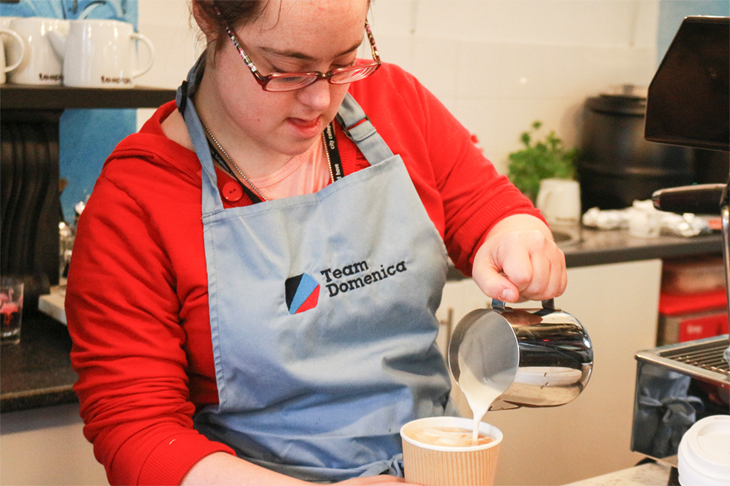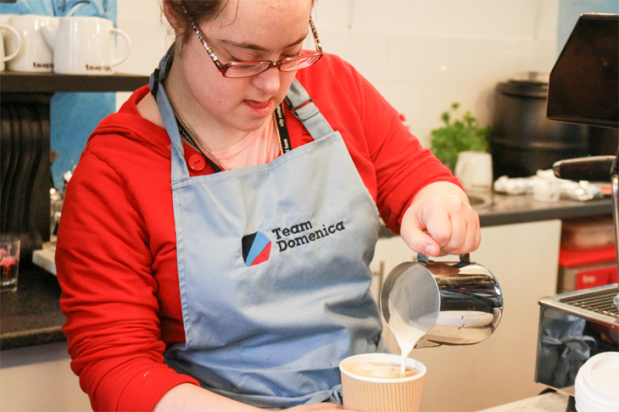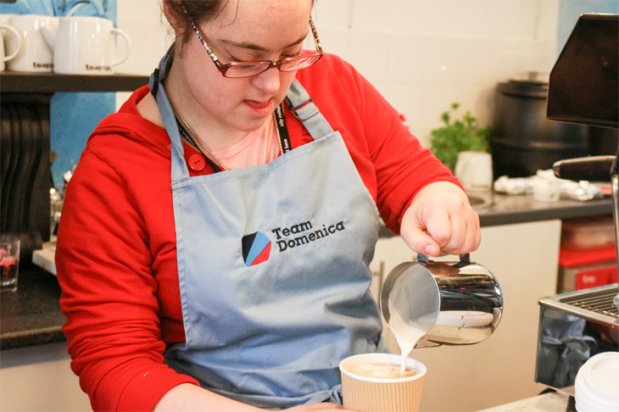Freud said ‘Love and work… work and love, that’s all there is.’ And ‘Love and work are the cornerstones of our humanness.’ What is life like for people with learning disabilities who have the cornerstone of the love of their parents, but who have little prospect of work?
Approximately 1.4 million people in the UK have a learning disability, yet 1.3 million of them are unemployed. Think of the misery that figure represents, the isolation and loneliness. The October 2016 Department of Work and Pensions Green Paper, Improving Lives, states: ‘The evidence is clear that work and health are linked.’ It says that there are 1.5 million people in receipt of the Employment and Support Allowance benefit, yet acknowledges that there is little practical support to help them into work. It accepts that ‘the longer a person is out of work, the more their health and well being is likely to deteriorate… so every day matters’. But it barely focuses at all on people with a learning disability.
In September 2016 I started a charity in Brighton, Team Domenica — named after my youngest daughter, who has Down’s Syndrome. The purpose of the charity is to get young adults with learning disabilities into employment because I found, as have so many other parents, that there was nothing for my child to do to once she had left college. Our charity has 21 trainees and it runs a year’s course in supported employment, in partnership with Brighton City College. We also have a training café which is open to the public, where our young men and women can hone their practical and social skills. We have an on-site business, where they weigh and package spices, stick on labels and parcel up the goods. Our kitchen is also a mini-business: they select items they would like to see sold in the café, make the shopping list, do the shopping, cook, price up and deliver to the café. But what next?
According to the Improving Lives Green Paper, several of them should be entitled to ‘personal support from accredited coaches’ to accompany them into work. This would be wonderful — many will need one-on-one support throughout the day — but we have so far failed to gain any of this ‘access to work’ funding. It only applies, we’ve been told, if the work is paid.
Pay is the really thorny issue. The single thing that makes it most difficult to get people with learning disabilities into work is the ratcheting up of the minimum wage, which from 1 April goes up to £7.05 per hour if you are aged between 21 and 24, and £7.50 if you are older. On the whole, employers are not charities, and it is difficult for them to employ people if their output amounts to a loss. Most of our graduates will manage only eight to 15 hours a week. Yet even to raise the subject of exempting disabled workers from the minimum wage, letting employers pay them less, is to be considered brutish and inhumane.
In 2011 a Conservative MP made a speech in the House of Commons on the employment opportunities bill. He declared it a scandal that only ‘6 per cent of people with learning disabilities have a job’ and said, ‘If legislators are not prepared to accept that the minimum wage is making it harder for some of those vulnerable people to get on the first rung of the jobs ladder, we will never get anywhere in trying to help these people into employment.’ For this thoughtful intervention, he was described as ‘insane’, ‘disgusting’, ‘like Hitler’. The Daily Mirror declared: ‘This is a contemptible bid to impose slave labour.’
Just over two years ago, Sigmund Freud’s great grandson Lord (David) Freud, then a minister in the DWP, was asked a question on the subject by a Tory councillor, David Scott, who said: ‘I have a number of mentally damaged individuals, who to be quite frank aren’t worth the minimum wage, but want to work… but you can’t find people who are willing to pay the minimum wage. How do you deal with those sorts of cases?’
Freud replied: ‘I know exactly what you mean, where actually as you say they’re not worth the full wage, and I’m going to go and think about that particular issue, whether there is something we can do nationally.’
The backlash was spectacular. Ed Miliband declared ‘The Nasty Party is back’; and various disability charities, such as Mencap, denounced Freud. Esther McVey, a fellow-Tory who was the disability minister in the same department as Freud, said on the BBC Daily Politics programme that ‘Those words will haunt him… he will have to explain himself.’
As the mother of a child with a learning disability, I followed these events with mounting anger. It is so obvious to most parents in my position that a therapeutic exemption from the minimum wage would have a transformative effect.
But policy makers seem to live in an abstract world, driven by the idea of ‘ending inequality’ without looking at the real lives of people involved. They obsess on the ‘human right’ of disabled adults to receive the minimum wage; they are more interested in political slogans than in understanding what would be the best thing in practice. Because in practice, money isn’t the real point. People with a learning disability may still be living with their parents. Very often they have no understanding of money (Domenica was given a £5 tip on one of her work placements, and asked me if she could now go to New York). They want to work so as to have a fulfilling and purposeful life.
When I am in our training centre, speaking to our students when they return from a work placement, I can see how changed they are. When they say ‘I’ve been to work today’, they look confident and happy.
I look ahead to the new intake we are welcoming to Brighton in September, and to the opening of a new centre in Eastbourne, which is in the planning stages, and I just hope that politicians see sense. Services are closing, and day centres barely exist any more, so what lies ahead for people like my daughter? Unless the law changes, they can expect a life spent in the shadows, slumped on a sofa, eating the wrong sort of food, watching daytime television. This is not about the right to a minimum wage, it is about the right to have the human dignity that comes with work, and with being included.
Listen to Rosa Monckton discussing this article on BBC radio:
Got something to add? Join the discussion and comment below.
Get 10 issues for just $10
Subscribe to The Spectator Australia today for the next 10 magazine issues, plus full online access, for just $10.














Comments
Don't miss out
Join the conversation with other Spectator Australia readers. Subscribe to leave a comment.
SUBSCRIBEAlready a subscriber? Log in